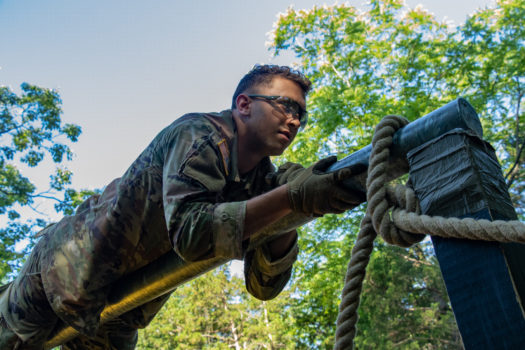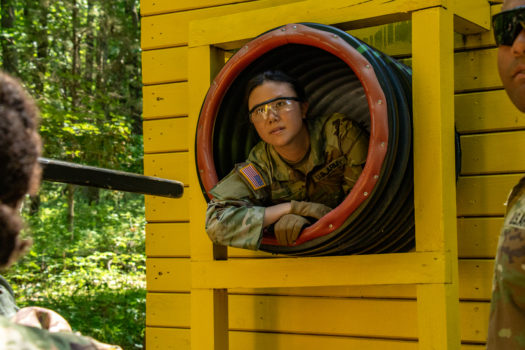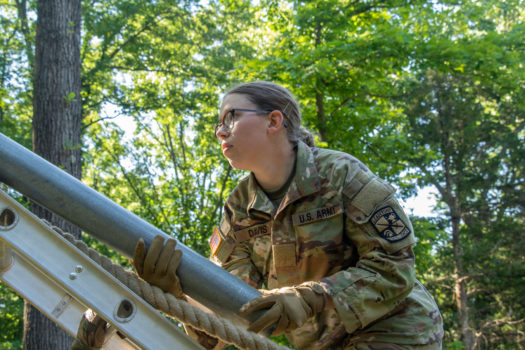Cadets at Cadet Summer Training join the Reserve Officer Training Corps for various reasons.
For Cadet Andrew McPoyle from James Madison University, one reason for joining was a family history of military service. His grandfather, uncle and three of his four brothers serve or have served in the Army.

“I was interested to join the Army, become an officer, because my family has a military history and I wanted to join that tradition,” McPoyle said. “I’ve always wanted to serve.”
McPoyle said he wanted to join the Army and pursue an education, so joining ROTC was the best choice for him.
“I’m blessed to go to a good [ROTC] program at James Madison,” McPoyle said.
Major Nicholas Andrychowski, the assistant professor of military science at Michigan University, said McPoyle stood out to him even before he had the chance to meet him.
“In receiving the paperwork from Merrill company, what stood out to me about Cadet McPoyle was his 587 on the Army combat fitness test,” Andrychowski said. “That’s an individual that came to CST physically and mentally prepared and in a high stress, very early morning, performed exceptionally on the ACFT.”
McPoyle said he was happy with his ACFT score.
“I just figured I’d try my hardest, I always do,” McPoyle said. “I mean, I know it wasn’t recorded or anything or pass fail, but I always like to go out there and do whatever I can.”
McPoyle attempts to carry that same mindset into other aspects of training including getting to know the people in his squad.
“It’s a lot of fun meeting new people,” McPoyle said. “Everyone’s a different character. It’s fun to learn and figure out how to deal with different people’s knowledge and the way they learn things and adapt and overcome those challenges with other people.”
McPoyle said the field leadership reaction course training, which the company completed June 22, definitely made his squad grow closer as a team.

“Basically, we went to a bunch of different stations, and we had to figure out how to complete a certain task with our squad by having a squad leader command us and figure out a way to work as a team to make the task a success,” said Cadet Andrew McPoyle from James Madison University.
McPoyle led his squad through a training scenario called the wall banger. This event involves Cadets getting a box of supplies and their entire team across an obstacle safely in 15 minutes without simulated injuries or loss of supplies.
McPoyle said when the squad first got to the station, they had to choose a team leader. Once the leader was selected, the Cadre member who ran that training scenario, instructed the squad leader on how to brief his team. After the brief, the squad made a plan and then tried to complete the mission using their plan.
McPoyle said although his squad did not successfully complete the mission, they did learn more about each other and how to work together.

The regimental Cadre, had only known the Cadets for a few days at the time of the FLRC training event, but Andrychowski said there are little things that stand out about McPoyle.
“It’s his volunteerism,” Andrychowski said. “It’s his teamwork. It’s a lot of the intangibles that if you didn’t have a sharp eye you might not observe, but up to this point he’s demonstrated all those.”
Andrychowski said in the absence of being assigned a leadership position, McPoyle has volunteered to be his company’s guidon bearer.
McPoyle said mindset is important for those joining the ROTC program.
“If you want to join ROTC, you definitely have to be committed to it,” McPoyle said. “It comes with a lot of responsibilities and character.”




